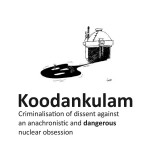CNDP Nuclear Updates
(compiled and summarised by Sonali Huria)
India tests nuclear-capable Prithvi-II mid-range missile
India test-fired its indigenously-developed, nuclear-capable ‘Prithvi-II’ surface-to-surface missile from the Integrated Test Range at Chandipur in Balasore district, about 230 km from Bhubaneswar, Odisha during the last week of March 2014. The said ballistic missile, with a maximum range of 350 km is one of the five missiles being developed under the country’s “Integrated Guided Missile Development Programme”.
LINKS FOR FURTHER READING:
http://timesofindia.indiatimes.com/india/India-successfully-tests-nuclear-capable-Prithvi-II-missile/articleshow/32832000.cms
http://rt.com/news/india-midrange-ballistic-test-981/
India tests submarine-launched underwater nuclear ballistic missile
India test-fired a submarine-launched ballistic missile (SLBM) from a submersible pontoon in the Bay of Bengal on 24 March 2014. The said missile, tentatively dubbed K-4, has a range over 2,000 km and is part of the “K” series of underwater missiles being developed by the Defence Research and Development Organisation (DRDO) towards building a ‘credible nuclear weapons triad’.According to news reports, the said test is believed to have been discussed during the annual DRDO Directors’ Conference, attended by the Defence Minister, A K Antony and National Security Advisor, Shivshankar Menon. Reports further suggest that the submarine-launched ballistic missile (SLBM) is being readied for deployment on various platforms including the indigenous nuclear submarine INS Arihant.
LINKS FOR FURTHER READING:
http://timesofindia.indiatimes.com/india/India-tests-new-underwater-nuclear-missile/articleshow/32694060.cms
http://www.business-standard.com/article/pti-stories/india-test-fires-long-range-n-missile-launched-from-under-sea-114032501060_1.html
India at the Nuclear Security Summit 2014: Cautions world against nuclear terrorism; reiterates ‘commitment’ to nuclear weapons-free world and to ‘safe’ nuclear energy
External Affairs Minister, Salman Khurshid, addressing the Nuclear Security Summit hosted by the Netherlands from 24-25 March 2014 stated that nuclear terrorism and clandestine proliferation of nuclear material and weapons of mass destruction, including by “non-state actors”, pose a serious threat to global peace and security and any breach in nuclear security could undermine ‘public confidence in atomic energy’. Speaking of India’s commitment to a nuclear weapons-free world, the Minister is reported to have stated, “We are proud of our record on nuclear security and nuclear non-proliferation but we are not complacent.” The Minister added that the Government of India envisaged a major expansion of atomic energy in the coming decades from just over 5000 MW at present to 20,000 MW by 2020 and 60,000 MW by 2030. Further, Mr Khurshid is reported to have said that following the tragedy in Fukushima in 2011, India has ‘comprehensively reviewed’ safety measures at all its nuclear facilities.
LINKS FOR FURTHER READING:
http://articles.economictimes.indiatimes.com/2014-03-25/news/48559312_1_nuclear-security-nuclear-terrorism-clandestine-proliferation
http://www.firstpost.com/world/india-committed-to-world-free-of-nuclear-weapons-khurshid-1450967.html
http://indianexpress.com/article/india/india-others/khurshid-nuclear-terrorism-serious-threat-to-global-peace/
Hyderabad hosts three-day ‘Uranium Film Festival’
A three-day ‘Uranium Film Festival’ was hosted at the St Francis College for Women, Hyderabad, Andhra Pradesh from 28 March 2014. The travelling Film Fest which is in its second edition showcased various independent animation, comedy, and fiction films as well as documentaries which highlight the various adverse and deadly effects of nuclear energy. The Uranium Film Festival is an initiative from Rio, Brazil, and has been showcasing international award-winning films on the detrimental effects of nuclear energy from across the globe. Apart from Hyderabad, the fest is expected to travel across many other Indian cities including Ahmedabad, Manipal, Bengaluru, Mumbai and Tatanagar.
LINK FOR FURTHER READING:
http://www.newindianexpress.com/cities/hyderabad/What-You-Didn%E2%80%99t-Know-About-Nuclear-Energy/2014/03/29/article2137799.ece1#.Uzu3bna1_Gh

